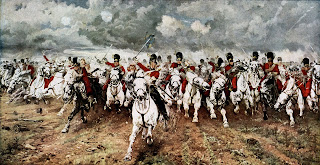Saturday, April 23, 2016
Reducing military spending will make us more secure.
With England's "Glorious Revolution" of 1688, England permanently established its independence from French influence. At the time, England's population and economy were roughly half the size of France's. What followed was a 127 year war of attrition for world domination that ended at Waterloo in 1812 with England's victory over France. How did England pull this off? I think is came down to one thing. The English people viewed their government as more legitimate because it downsized its military during peacetime.
The war with France was actually a series of wars between periods of peace. During the times of peace, the English government would reduce spending and the economy would grow. This legitimized the English government and enable it to raise taxes in wartime. The English aristocracy was willing to pay these taxes because they were temporary and necessary. The English government was thus able to match France's spending during wartime even though its economy was much smaller. The French monarchy was much more corrupt and did not reduce spending in peace time. During wartime, the French aristocracy was not willing to pay taxes because they felt their money would be wasted and that it would only lead to more taxes. As a result, by the time the French finally got rid of their monarchy in 1789, England's economy had grown to equal France's.
During the Cold War, the US was threatened by the Soviet Union and we needed to respond to that threat. But that threat went away with the collapse of the Soviet Union. While there was some downsizing of the military, it was not nearly enough. When I left the Navy in 1991, there were 18 Trident submarines either in operation or under construction. Guess how many there are in operation today? 18! My ship is still in operation 25 years after the collapse of the Soviet Union, 25 years after the threat it was built for went away. In the 1980's, at the height of the Cold War, US defense spending was about 6% of GDP. After the collapse of the Soviet Union, US defense spending gradually declined to about 3.5% of GDP in 2001. In 2015, defense spending was about 4.5% of GDP. The Russian economy is currently about 7% the size of the United State's economy. Russia is not the biggest threat facing the United States, it's China. China's economy is about 50% the size of the US economy and growing fast, a situation similar to England and France in 1688. China's defense budget is difficult to determine but is somewhere around 1% of GDP (about 20% of US defense spending). This lower defense spending and faster economic growth in China are related. With current trends, China's economy is predicted to overtake the US in 11 years. We need to get our defense spending down now, while China is not a military threat, and grow our economy. Otherwise we are heading for our own Waterloo.
Tuesday, January 19, 2016
Presidential Elections
I supported Barack Obama for president in the 2008 election. As the election was approaching, Obama had a comfortable lead in the polls. I wanted to be a part of this historical event so I decided to be a poll worker. I volunteered and went through the training program. I was assigned to a mostly African American polling station in an Atlanta housing project.
I ended up working the registration computers because I had the best computer skills even though I was the least experienced poll worker. There were some computer problems and the line was out the door all day long. Hundreds of people came to vote. Many were elderly and had not voted since the Kennedy election. Many people had registration issues. We tried everything we could to allow them to vote but often we could not. When we called city officials for help the response was always the same, "do not let them vote." It was not voter suppression but more a case of not wanting to take any chances in risking the integrity of the election. The voters took it in stride. They knew Barack Obama was going to win and they were excited about it. It felt like a big party all day long.
One major concern I did have was with the computer voting machines. The voting computers printed out a tally of the vote at the end of the day that we collected and passed on, along with the memory cards. There was no way the poll workers could verify that the printout was accurate. There really is no system of checks on the voting machines and it would be simple to rig them. With so much at stake, this is ludicrous, and we should not stand for it. Even if it takes going back to paper ballots, I would prefer that to using a system so susceptible to fraud.
Like most people, I am particularly disappointed in this year's presidential election. There is enormous rage against both parties. People are fed up and desperate. I think the support for Trump is a protest vote more than anything. People know he is a buffoon. What people are saying is that, given a choice between a clown and the status-quo, a clown is better. I hear you.
Subscribe to:
Comments (Atom)


